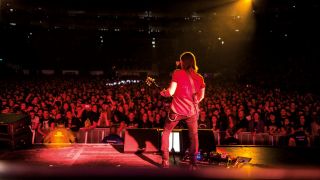There’s an eerie echo to the grey backstage area of London’s O2 Arena. It might be the most prestigious indoor venue in the country, but the only sign that this is a hugely significant evening in the future of rock music is a mechanical ‘thumpthump- thump’ and occasional muffled cheers from behind the walls, as tonight’s opening band, Like A Storm, run through their set.
But suddenly, as we turn yet another corner, the reason 20,000 people have showed up tonight is staring us right in the face: Alter Bridge are here. Bassist Brian Marshall and drummer Scott Phillips seem relaxed, chatting in the corridor. Guitarist Mark Tremonti’s kids have come to join him in London and he’s holed up in his dressing room enjoying some family time while, as we later discover, surrounded by a humongous pile of soft toys. Vocalist Myles Kennedy is less chilled. Rather than happily conversing or hanging out with his loved ones, he is nervously pacing up and down and karate-kicking the air. Brian cocks his head, raises his eyebrow and says to his singer, “Dude, relax. Just try and enjoy it.”
“I’m fine,” says Myles, when we finally get to sit down with him later. “I was really enjoying the tour. Then last night in Manchester we had a few sound problems, and now I’m kind of worried. Because I know that tonight is a big deal, I just don’t want to let these people down.”
Myles Kennedy and Alter Bridge have yet to let down anyone who likes contemporary hard rock. The scepticism and stigma of being the new project from the former members of Creed disappeared almost the instant the band first arrived on British soil more than a decade ago. They’ve slowly built their way up, album by album, tour by tour, to the point where they are now rightly regarded as one of the few future festival headliners. Recent album The Last Hero even hit the UK charts at Number Three. Their journey has happened, as Mark will point out later, “the right way”.
“Tonight’s more than just a gig,” Myles smiles. “It’s a landmark career achievement. I remember when we first came to the UK, our publicist said, ‘One day you’ll be playing Wembley Arena.’ Always the pessimist, I said, ‘Yeah, right!’ Sure enough, it happened, and people then talked about The O2… I remember thinking that I’ll believe it when I see it.”
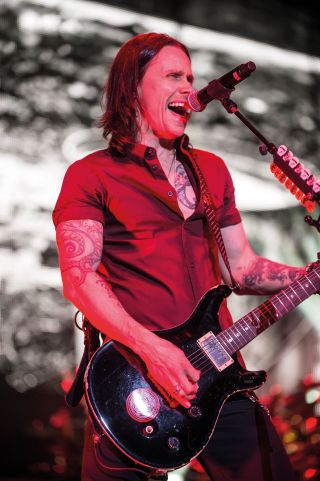
This isn’t the first or the last time we’ll see this side of Myles Kennedy. It’s one of many things that makes him such an enigmatic character in our world. Blessed with movie-star good looks, world-class musical ability and, most astonishingly, that famous, soaring, honey-soaked voice, he can hold an arena of fans in the palm of his hand. But when talking to him one-on-one, he’s shy and self-deprecating. It’s difficult to imagine that the life-affirming, fist-pumping anthems Alter Bridge write can be attributed to the unassuming gent in front of us.
“It’s a bit of a dichotomy I’ve always had,” he reveals. “I think sometimes those songs are written as a mantra to myself. They are like my own [American celebrity life coach] Tony Robbins messages conveyed into song, because I’ve always naturally been a very glass-halfempty kind of person. But I also have this side that believes in the idea that what you focus on will manifest itself. While there is this darker side, there’s another side that believes in goals and just getting down and working hard. So there is this Yin and Yang to me. I’m an interesting study, I guess.”
Myles is a product of his experiences with fame. He spent years trying to make a living in bands, before giving up on The Mayfield Four in the early 00s. He was battling depression due to tinnitus, and had become weary of playing the game, putting everything into his music but achieving minimal success.
“I was so lost and really heartbroken,” he tells us. “I was ready to settle down and just concentrate on teaching guitar. I was really disillusioned by the music industry. I couldn’t understand how I could work so hard and get so little back from it; it was making me very bitter.”
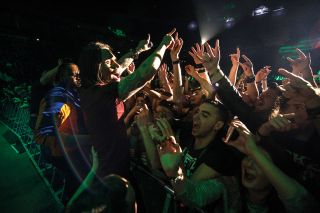
It was his wife, Selena, who encouraged him during periods of difficulty, and refused to let his talent go to waste. “She just wanted me to be happy, but we missed each other so much,” he remembers. You’re away from each other, you don’t have much money, and you make so many sacrifices when you’re a musician. You wonder if it is worth it. I put so much of myself into my music, and to get all this rejection was not something I took very well. She always believed in me and she always told me that I was good. So, the person who was the reason I nearly quit was oddly the person who kept me going.”
That belief was rewarded when Alter Bridge came knocking in November 2003. Creed had disbanded due to the erratic behaviour of frontman Scott Stapp, and Mark Tremonti and co were on the lookout for a fresh voice to accompany their new start. They remembered Myles from a support slot in 1998.
“I started asking myself questions,” Myles recalls. “If this were to pan out, are you ready to get back in the saddle and get your rock’n’roll cleats on? There was a little bit of soul-searching.”
Myles travelled from his hometown of Spokane, Washington, to rehearsals in Orlando. There he began climbing a steep learning curve. Not only was he playing with members of a multiplatinum group that had a storied history, he was about to be thrust into the spotlight.
“I had to psychologically address the idea that they’d come from a successful band. Once it was unveiled to the world, I knew there would be a lot of scrutiny. I dealt with it by putting my head in the sand. I didn’t read press. I didn’t read social media. I was concerned with learning to be a frontman,” he explains. “That was the toughest thing I’ve ever had to do. You take away a guitar from a guy that’s been playing for 20 years, and you feel very naked. I remember watching a lot of Freddie Mercury footage and trying to learn from the greats.”
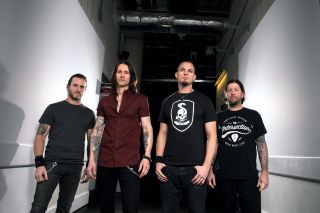
Learn he did, playing to ever-bigger crowds. But if it wasn’t for Alter Bridge’s phonecall that autumn day, the world might never have noticed his talents.
“I was very lucky that Mark and the guys reached out to me, and then I was lucky a few years later when Slash reached out to me, too,” he says. “I owe my entire career to the belief that these people have shown in me, because I struggled to believe in myself. If you’d have told me back then that I’d be playing a venue like The O2, I’d think you were insane. It wasn’t even like the dream was dead – the dream wasn’t even a consideration to me.”
This down-to-earth attitude makes Myles a rarity among arena-commanding frontmen: someone rich in talent and poor in ego.
“If other people went through the Myles Kennedy school of hard knocks, maybe it would be different!” he laughs. “It just took me so long. A lot of people end up having success by the time they’re in their mid-to-late 20s, but I didn’t have quoteunquote ‘success’ until I was hovering around 40. It took decades of slugging it out, and I don’t take it for granted.”
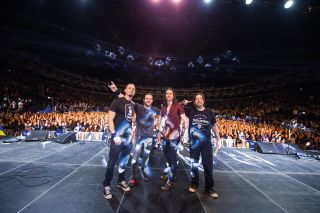
It’s easy to see what Slash saw in Myles. After years of working with the famously untameable Axl Rose, he must have seemed like a blessing. His impact has been so great that his name is now listed alongside the iconic, top hat-sporting six-stringer on any promotional material. Surely that makes you a rock star, Myles?
“Slash is my friend and I love working with him,” he smiles, before scoffing, “I really don’t feel like a rock star! That seems like an odd term for me. I nearly committed to doing something with Velvet Revolver after Creed reformed and Scott Weiland left in 2009. But that felt like a lot of weight; Scott Weiland was one of those guys – a rock star. Those would have been pretty big shoes to fill…”
Myles tails off, clearly uncomfortable with considering himself in such terms. All of which makes what happens later this evening even more remarkable. At a sold-out O2 Arena, Alter Bridge put on a show that couldn’t live anywhere else. Myles is the conductor, the focal point, the star. It’s here onstage, not awkwardly pacing around behind the scenes, that he truly looks at home. It’s fair to say that if Alter Bridge hadn’t recruited Myles, they would never have enjoyed this level of success. Mark is quick to nod his head vigorously in agreement.
“Myles would tell you something totally different,” he grins. “But we couldn’t have done Alter Bridge with anyone else. It was the right guy, the right fit, at the right time. We aren’t showy, we’ll never be the most wild or eccentric guys, but we have star power with him in the band.”
Earlier in the day, when asked what he thought about people earmarking them as potential Download headliners, Myles squirmed in his seat. “I didn’t go there in 2005 and say, ‘One day we’re going to headline this!’” he exclaims. “I like playing second fiddle… I don’t know.”
Then we asked if he could pinpoint the moment he realised he’d made it. “You’re talking to someone who still believes this is all going to end tomorrow,” he shoots back. “So it’s hard for me to answer that question. I’m not sure that I’ve even really arrived. But it’s the O2 tonight, so maybe this is the night it happens…”
Not sure he’s made it? He’s the only person who feels that way. Even in an arena of 20,000 people, Myles Kennedy is one of a kind.
ALTER BRIDGE’S THE LAST HERO IS OUT NOW VIA NAPALM
Alter Bridge live review - o2 Arena, London
My Life Story: Alter Bridge's Myles Kennedy
Alter Bridge’s Myles Kennedy: The Day I Auditioned For Led Zeppelin
